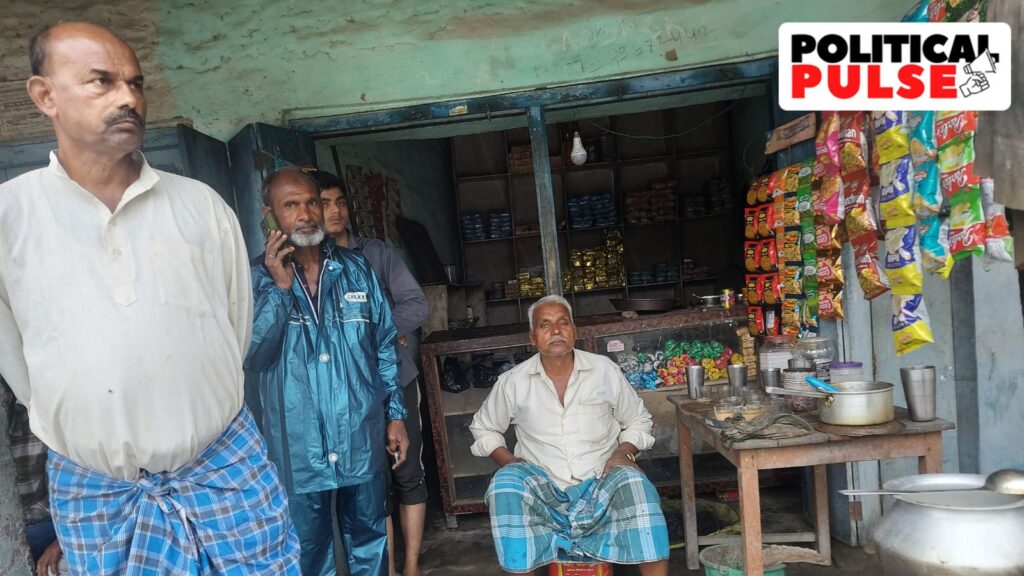Against the backdrop of the Special Intensive Revision (SIR) of electoral rolls in Bihar, Congress leader Rahul Gandhi set off on his “Voter Adhikar Yatra” from Sasaram on August 17. In a whirlwind campaign covering 1,300 km across 20 districts and culminating in a massive rally at Patna’s Gandhi Maidan on September 1, Gandhi, often joined by RJD chief and Mahagathbandhan’s CM face Tejashwi Yadav, accused the ruling party of “vote chori (theft)”.
The yatra drew huge crowds and, buoyed by the turnout, the Congress demanded a greater share of seats within the Mahagathbandhan, one of the reasons that delayed the alliance’s seat-sharing deal. Yet, on the ground in north Bihar, parts of which the yatra passed through in its last week, “vote chori” appears to have failed to strike a chord. In fact, few talk about it unless specifically asked, even as Gandhi and other Congress leaders continue to raise it in their campaign stops across the state.
In East Champaran’s Chiraiya constituency, mechanic Mahesh Yadav and ration dealer Ramlal Gupta, friends but political opposites, reflect this disconnect. Yadav, an RJD supporter, says he is voting for Tejashwi because “the Lalu (Prasad) scion is addressing the jobs issue and there is a general mood for change”. Gupta, a long-time BJP voter, is more pragmatic about the social reality. “There’s nothing wrong with the government; ultimately, people will vote on caste,” he says.
When asked about “vote chori,” Yadav pauses before responding, “That is a problem. EVM mein gadbadi hai (EVMs are a problem). When ballots were there, it was good.”
Gupta laughs. “So, according to you, one man casting five votes was fine? Don’t we know what happened in the ballot days? EVMs are online, nothing can be tampered with. Tomorrow you’ll say Google has been stolen.”
When told that “vote chori” pertains to electoral rolls, not machines, both shrug it off. “That is not an issue in these elections,” they say in unison.
Even among Muslims, at the centre of fears of disenfranchisement, there appears to be little resonance. At a tea stall in Ramanagar, a Muslim-majority village in the Darbhanga Rural constituency, 50-year-old Mohammed Iftikhar, an RJD voter, says, “I have 16 votes in my family. All are on the voter list. I enrolled five more and they’ve also been included. Those saying there is vote chori must explain how it is happening. We don’t understand it.”
Nearby, 30-year-old Mohammed Ishtiyaq adds, “Nobody cares about what Rahul Gandhi says. In rural areas, it’s the candidate that matters. The Muslim vote here will split between Jan Suraaj, Asaduddin Owaisi, and the lantern (RJD’s symbol), based on local issues.”
In the adjacent Alinagar constituency, Mohammed Alam of Pohaddi Vela village estimates “not more than 10% people” even discuss the issue. “Voting will be guided by what people have got or not got from the government. Then there are fixed voting loyalties. I don’t have to tell you where I will vote, you probably know it,” he smiles.
Even in Lalu Prasad Yadav’s native village of Phulwaria in Gopalganj district, there are few takers of the “vote chori” narrative. “I do not believe that through exercises such as the SIR, you can manipulate voter rolls in a manner that favours one party,” says Durgesh Yadav, 30.
In East Champaran’s Madhopur village, Atiqur Rehman calls “vote chori” an unnecessary issue. “This is a Muslim-dominated village. I haven’t met anyone whose name was deleted. Yes, people have doubts about EVMs, but then the Opposition also wins states. This election is about jobs and migration,” he says.
An RJD leader in Patna puts it bluntly: “It was a difficult issue to wrap the elections around in the first place. If you are in the voter rolls, it doesn’t matter to you. And if you are out of it, you don’t matter to the elections.”
At the village of Ratanmala in West Champaran’s Bagaha subdivision, farmer Ram Dayal Kushwaha, who intends to vote for the Congress, finds fault with Gandhi’s campaign itself. “Vote chori was picked up because they (Mahagathbandhan) had no issue. The problem with Rahul Gandhi is that he doesn’t know what people’s issues are. He should talk to us farmers: our crops get destroyed every year in floods,” he says.
“Gandhi’s campaigns are largely negative,” Kushwaha continues. “He should say he’ll do better than (Prime Minister Narendra) Modi. If two shopkeepers sell rice and one says the other’s rice has gravel, people will find out. And if they don’t find any gravel, they’ll stop trusting the one making accusations. The shopkeeper should simply say, ‘My rice is better, try it once.’”
As the Bihar election heads towards the second phase on November 11, Gandhi’s “vote chori” pitch seems to have run into a wall of everyday concerns: jobs, caste, welfare, and local grievances. His campaign may have stirred crowds, but on the ground, it is these quieter, more immediate anxieties that continue to define how the state votes.

